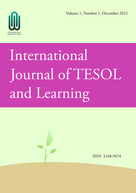


Volume 11 Issues 1-4 (2022-12-31)
Volume 10 Issues 3&4 (2021-12-31)
Volume 10 Issues 1&2 (2021-06-30)
Volume 9 Issues 3&4 (2020-12-31)
Volume 9 Issues 1&2 (2020-06-30)
Volume 7 Issues 3&4 (2018-12-31)
Volume 6 Issues 3&4 (2017-12-31)
Volume 6 Issues 1&2 (2017-06-30)
Volume 5 Issues 1&2 (2016-06-30)
As the world is becoming more diverse, internationalization has become an integral part of strategic and curriculum planning initiatives across universities and colleges in the US and around the world (Sharma & Phillion, 2014). Internationalization in higher education embodies the integration of international and intercultural dimensions into teaching, research, and service functions (Maringe & Fosket, 2010). Many universities have adopted a two-pronged approach to internationalization: “home-based (internationalization at home) and overseas-based (internationalization abroad)” activities (Maringe & Fosket, 2010, p. 5). Further, they “have begun to recognize the importance of developing teaching and instructional programmes that have both local and international relevance, both to recruit students in a global market and also to prepare all their students for lives in a globalized world” (p. 7). Thus far, teacher education field has many more rooms to be internationalized (Alfaro, 2008; Cushner, 2007; Stewart, 2013). Some students may participate in international study or travel experiences; the faculty may conduct research outside the US; or courses may exist in comparative, multicultural, or international education degree programs; however, rarely are these efforts fully integrated into teacher preparation programs. Strict course or state requirements for teacher licensure and student teaching demands leave little room for studying abroad, studying a foreign language, or taking internationally-oriented courses as electives (Longview Foundation, 2008).
Although research shows that international service learning (ISL) experiences and collaborative teaching can facilitate development of cultural responsiveness in pre-service teachers, the impact of multilingual/multicultural collaborative teaching in ISL on pre-service ESL teachers has not been studied. This paper investigates the professional development of 14 American, Mexican American, and Asian undergraduate pre-service ESL teachers and graduate students during and after a 4-week ISL program in Mexico. Guided by sociocultural learning theory, the study explores how collaboration among linguistically and culturally diverse peers helped the participants adopt characteristics of culturally responsive teaching. Through qualitative analysis of the reflection and interview data, the findings show that the participants developed awareness of diverse in-group cultures and cultural responsiveness over time. Furthermore, this positive impact was sustained two years after the experience. This study supports multilingual/multicultural collaborative teaching in short-term ISL experiences as an effective way to enhance development of cultural responsiveness in ESL teacher education curricula.
This study explored how a short-term, two-week study abroad program to the Republic of Ireland impacted graduate and undergraduate students’ (preservice teachers) dispositions towards teaching English learners (ELs). Participants included 22 students from various degree programs: eight from an elementary teacher education program, eight international students enrolled in a Master’s graduate program in ESOL, and six from mixed disciplines. The study abroad experience consisted of two weeks where students stayed in Irish homestays and participated in academic lectures, observations of Irish students in English- and Irish-medium schools, and Irish cultural events. Data included pre- and post- surveys, three student reflections, and a final course paper. Data revealed that participants’ dispositions toward working with linguistically diverse students heavily emphasized building empathy, inclusion, and bridging language difference among participants and EL students.
It is well documented in the United States and in other countries that culturally competent educators improve the success of diverse students in the K-12 classrooms. Most teacher education programs in the United States and elsewhere expose prospective teachers to coursework that addresses culture and linguistic differences. This qualitative study examined prospective teachers from the United States and South Africa as they developed intercultural knowledge and competencies using the TRANSABCs model in a telecollaborative exchange. This study used the Association of American Colleges and Universities’ (AAC&U) Intercultural Knowledge and Competence VALUE Rubric to identify themes. Three themes permeated throughout this study: cultural self-awareness, knowledge of cultural-worldview frameworks and curiosity. As evident with this study, prospective teachers who engage in telecollaborative exchanges find increased abilities to navigate unfamiliar cultures, improve foreign language skills and articulate a critical perspective on the world.